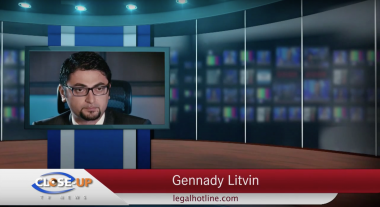Introduction
Just five years out of law school, Gennady Litvin ran a bustling legal practice that took in millions of dollars from distressed homeowners who hoped they could avoid foreclosure.
The Litvin Law Firm grossed $5.2 million in 2013, much of it from financially strapped clients who paid $500 a month or more for help negotiating lower mortgage rates or other legal assistance to keep them from losing their homes. That year, Litvin drew a salary of $466,477, according to court filings.
But the Brooklyn, New York, law firm’s fortunes soured as it faced repeated accusations of fraud and other illegal conduct in complaints filed by state regulators and disgruntled clients, some of whom were low-income and minority homeowners who lost their property after trusting the firm. In March and April 2015, Litvin and the firm both filed for bankruptcy, leaving more than 4,500 potential creditors, mostly former clients.
“There was a ton of money that he made and where that money has gone, we don’t know,” said Cleveland lawyer Geoff McCarell.
McCarell represented Branko Perisic, of Parma, Ohio. Perisic ran a small trucking firm that fell on hard times as fuel prices spiked and demand for his services fell off during the recession. In 2011, he hired the Litvin firm to get him a break on his home mortgage.
Perisic paid a total of $4,760, but got nothing but stall tactics and unmet promises as his finances worsened, according to a lawsuit he filed.
In April 2015, a Cuyahoga County judge awarded Perisic $287,575. Most of the award was to punish Litvin for “fraudulent and/or deceptive conduct, and his willful, reckless and/or grossly negligent breaches of care and/or ethical duties to plaintiff,” according to the court docket.
But because of the bankruptcy case the chance of Perisic getting paid is “slim to none,” according to his attorney.
Litvin, who lists his current practice address as the Law Office of Yuriy Moshes in Brooklyn, would not discuss his legal career.

“Thank you for reaching out seeking comment but I have no comment to make on your article,” Litvin wrote in an email.
Litvin is one of hundreds of lawyers and law firms nationwide that have participated in suspect foreclosure “rescue” schemes in the wake of the housing market crash nearly a decade ago, a Center for Public Integrity investigation found. State and federal authorities contend these plans typically have violated a range of legal ethics codes and consumer-protection laws. But while dozens of lawyers have been stripped of their licenses for running them, many others have paid little in penalties — even when desperate homeowners lost millions of dollars. Litvin is in “good standing” with the Florida Bar Association, which oversees lawyers in the state. He is not eligible to practice there, however, unless he completes 30 hours of continuing legal education required of all lawyers, officials said.
In New York, Litvin has “no record of public discipline,” according to the New York State Unified Court System.
Litvin graduated in 2008 from the University of Miami School of Law and practiced in Florida and in Brooklyn. In a 2013 deposition, he recalled operating an “open door” practice, as in “anything that walks in through the door.”
Within two years, Litvin had cut a deal with telemarketers operating out of Fort Lauderdale who were pitching expert foreclosure relief plans nationwide for which homeowners paid $595 to $750 a month.
Sales of these foreclosure “rescue” plans took off in the wake of a 2009 federal government program that encouraged lenders to cut rates or balances on home mortgages through a review process known as loan modification.
Federal officials had hoped cutting loan balances would help millions of people behind on their mortgage payments from being foreclosed on. But they quickly were overwhelmed by complaints that scam artists were ripping off desperate homeowners by promising them loan modifications for a fee and not delivering.
Often, telemarketers partnered with a law firm, which gave them a look of legitimacy. The practice also exploited loopholes exempting lawyers from regulations that prohibited advance fees for securing loan modifications.
Litvin early on caught the attention of regulators in several states. In December 2011, Connecticut officials ordered Litvin to “cease and desist” from soliciting its residents because he lacked a license to practice law there. Officials in Georgia, Rhode Island and North Carolina later issued similar orders.
Litvin pushed back, arguing he had built a network of “affiliated” attorneys in 31 states, which he said permitted the firm to operate in those places and accept advance fees.
Some of the Litvin “affiliated” lawyers were hired in response to ads he posted on the online classifieds website Craigslist. The Litvin firm split the fees it received from homeowners with the affiliated attorneys, Litvin testified in a deposition.
One Litvin ad sought lawyers with “experience in the foreclosure defense area” who were “looking to make an extra $5,000 to $10,000 per month per state (and more with time) without having to increase their expenses.” At different times, Litvin listed at least 52 lawyers as affiliates.
In late 2012, the Federal Trade Commission sued the Florida telemarketers working with Litvin, alleging their customers suffered “significant economic injury,” including “going into foreclosure and even losing their homes.”

The FTC accused the telemarketers, who operated as Prime Legal Plans as well as under several other names, of taking $21 million in fees “from distressed homeowners through deception.” The FTC suit criticized the performance of the Litvin firm, but it did not name him or the firm as a defendant. The FTC would not discuss the matter.
According to the FTC, the marketers falsely promised clients that a “network of top-notch attorneys” would defend them against foreclosure actions and “win concessions from lenders that will result in lower mortgage payments.”
The FTC cited an email telemarketers sent to customers, written in capital letters, that read: “YOU HAVE RIGHTS, AND NOW HAVE AT YOUR DISPOSAL, AN ATTORNEY NETWORK THAT IS ABLE TO KEEP YOU IN YOUR HOME, HALT THE FORECLOSURE PROCESS, AND FIGHT FOR YOUR RIGHTS!”
In 2012, Litvin was enjoying his honeymoon in Hawaii when an associate phoned to tell him federal agents had raided the Fort Lauderdale offices and shuttered the sales operation, according to his deposition.
Despite the raid, Litvin forged ahead with his foreclosure practice. In New York, Litvin relied partly on a website to promote his services.
“Who said that a high quality defense attorney had to cost a fortune?” reads a note on the Litvin Law Firm’s website, which has since been taken off-line.
“Litvin Law firm understands that if you could afford to pay high attorney fees then you probably could afford to pay your mortgage.”
Nattily attired and confident, Litvin starred in several videos posted on YouTube, some replete with gushing testimonials from thankful clients. He also made appearances on New York radio and television, weighing in on a host of debt-relief strategies.
But punching back at regulators and civil lawsuits from upset clients began to take a toll and business dropped off sharply. In 2014, the firm took in $3.5 million, down from $5.2 million the year before. Litvin’s salary in 2014 fell to about $92,000 from $466,477 the previous year, according to bankruptcy court filings.
The Maryland Attorney General’s office filed administrative charges in 2014 questioning whether that money was made honestly, accusing the firm of projecting an “air of trustworthiness” while providing little or no legal services.
At least 129 of 500 Litvin clients in Maryland, who paid more than $1.4 million in fees, were foreclosed on anyway, according to the suit.
Sixty-three clients eventually lost their homes, while 10 others kept them only by resorting to bankruptcy, according to the Maryland attorney general’s research.
In New York, criticism from regulators was blistering. The New York Attorney General’s Office in a lawsuit accused the Litvin firm of “repeated and persistent fraud and illegality.” Potential clients were told they could “get foreclosures dismissed and mortgages deleted,” results the attorney general called “improbable at best,” according to the lawsuit.
Some clients, according to complaints, said the firm advised them to avoid contact with their lenders, leaving them in the dark about how their cases were proceeding, if they even were.
One couple alleged the Litvin firm led them to believe they would be given their Maryland home debt-free. Instead, the house where they had lived for two decades and raised six children was sold out from under them because the firm failed to complete paperwork to forestall foreclosure, according to a lawsuit they filed.
So far, both regulators and former clients — at least eight have sued Litvin for what his bankruptcy petition calls “malpractice and fraud” — have received nothing.
Litvin, in a June 2015 court filing, said the cost of defending lawsuits and a drop-off in clients “took a heavy financial toll” and that “bankruptcy loomed for me and for the firm.”
In that filing, Litvin denied misleading anyone and said he had saved his clients more than $75 million, including reductions in future mortgage payments.
The lawsuits are on hold while the Litvin bankruptcy cases play out. So is a $2.3 million federal court judgment from May 2015 that names an earlier Litvin legal partnership that operated out of Miami.
In court filings, Charles H. Lichtman, a Florida attorney appointed in the FTC case to chase after any possible money on behalf of victims, said he knew “collectability was problematic.” But Lichtman said he sought the judgment because of the firms’ “substantial roles in this massive consumer fraud,” and that he couldn’t “let them simply get away with it without recourse.”
Lichtman said in an interview that he handled hundreds of phone calls from people who lost their homes, or gave some of their “very last money” to the scheme.
“It caused them immense personal distress,” he said. “It was genuinely heartbreaking when you heard the stories.”
The New York Attorney General’s Office has sought more than $24 million from Litvin, half of it restitution and half as a penalty.
But in early May, the office offered to settle, for far less. The deal would require Litvin to pay $15,000 and for five years 15 percent of his annual salary, or $12,000, whichever is greater. The agreement says the minimum overall amount Litvin must pay is $75,000.
A hearing on the matter is set for July 19.
Read more in Inequality, Opportunity and Poverty
Inequality, Opportunity and Poverty
Why Mark Zuckerberg’s Senate hearing could mean little for Facebook’s privacy reform
Analysis: The social media company’s big lobbying and campaign investments could shield it from talk of significant regulations
Inequality, Opportunity and Poverty
The investment industry threatens state retirement plans to help workers save
States wrestle with impending retirement crisis as pensions disappear


Join the conversation
Show Comments